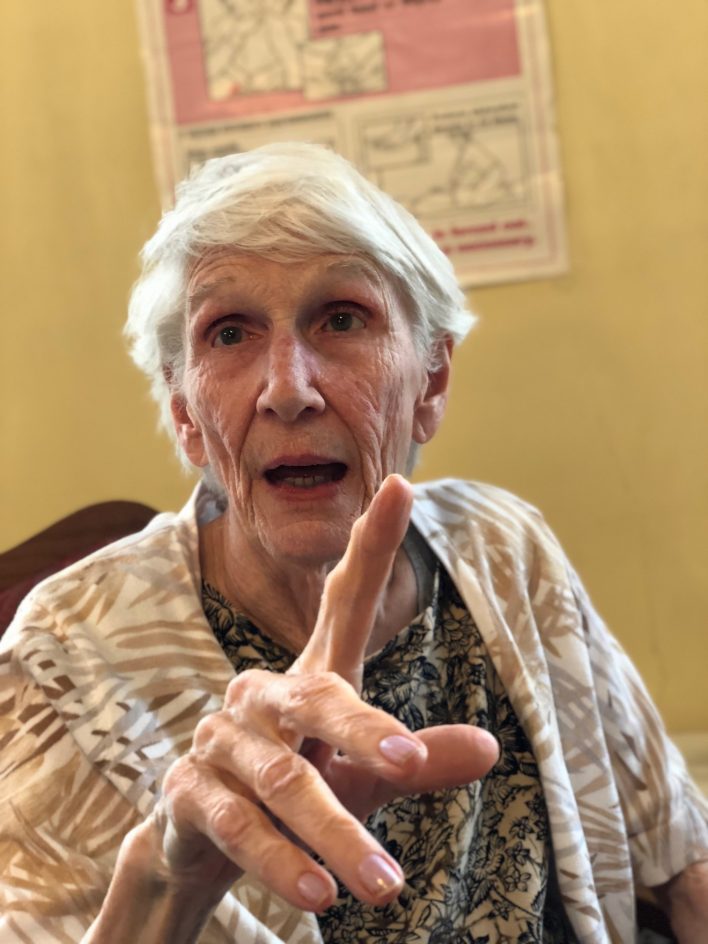
Joan and I have become friends, in the very curious way of relationships that evolve in my therapy work. It is common for me to love the people I meet in this work, it is very rare to see one as my friend.
I come and go, and usually Red is what people want to see, I don’t usually get the chance to get much closer than that. When I go to the Mansion, I have a lot of people to see and talk to, a lot of ground to cover, almost everyone there loves to touch a dog. But i can’t say we all are friends.
How does one become friends with someone who has severe memory trouble? I can’t really say, I’ve never had a friendship like this before. Joan and I just connect, we talk often and for long periods of time.
I doubt Joan knows my name or Red’s name or can remember either, but she knows both of us, and recognizes both of us, and we are both happy to see one another. You either connect with someone like Joan or you don’t. It isn’t about words, but feelings.
I do.
Tonight, I visited Joan at the Mansion, she and some of the other residents were having tea and scones. I had a cup of tea and sat down next to Joan, we talked in our easy but circular round-a-about way for more than a half hour. I love to talk to Joan, we go up and down, hither and yon, round the bend and over the hill.
She laughs, cries, shakes her head in wonder and exclaims. I could sit there forever. Two oddballs, I suppose, trying to be understood.
I often start the conversation by asking Joan about the Great Sacandaga Lake, settled by the Mohawk Indians and located at the base of the Adirondack foothills, about an hour and a half from the Mansion. Joan grew up there, in a big and beautiful house by the water, she says.
She told me how much she loved fishing, and what bait she used and what fish she caught. She talks about the handsome visitors to their big house, men who stayed around all summer. She talked about the children who defied her stern father’s orders and swam in the deep art of the lake. They often were found out and spanked. Her father, she said, was a tough and stern man.
She talked about the guests who wouldn’t leave and I asked her if she ever wanted to throw them out, and she looked horrified and shook her head and said, “oh, no, no, no, I could never do a thing like that.”
At some point, it seems, she was the town clerk of Sacandaga Lake, she mentions it but does not talk much about it.
It’s an interesting thing about memory, I have learned at the Mansion. It never really goes away, it just gets buried in places where people can’t get to it. If you find the right buzzwords and memories, it comes right up. It never actually dies, it just hides and the brain can’t find it.
I have known for some time that Joan’s young daughter was murdered by her boyfriend around the Sacandaga Lake, and seen old clippings about it.
Joan has many memories of the lake, but she never has mentioned her daughter. We had our longest talk about the lake, and her very beautiful and happy memories of growing up and living there. She misses it every day, she says. She often asks me to take her for a ride up there, perhaps one day I will get to do it.
Tonight, we had the nicest longest talk, like two old college chums getting together for a drink, always happy to see one another. As I got ready to leave and gather my things, Joan took my hand as she usually does and thanks me for talking to her. “I enjoy it,” she said, “I really do.”
And then she looked me in the eye and said, “you know, my husband is dead. My daughter is dead.” She started to say something and she clasped my hand with a surprisingly firm grip. And then the thought flew away, and wiped her eyes and ate some of her scone.
I have a date to take Joan out to lunch next week and also do some reading with her tomorrow. I doubt she will remember our date, but I will.
